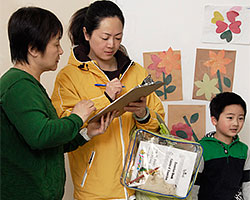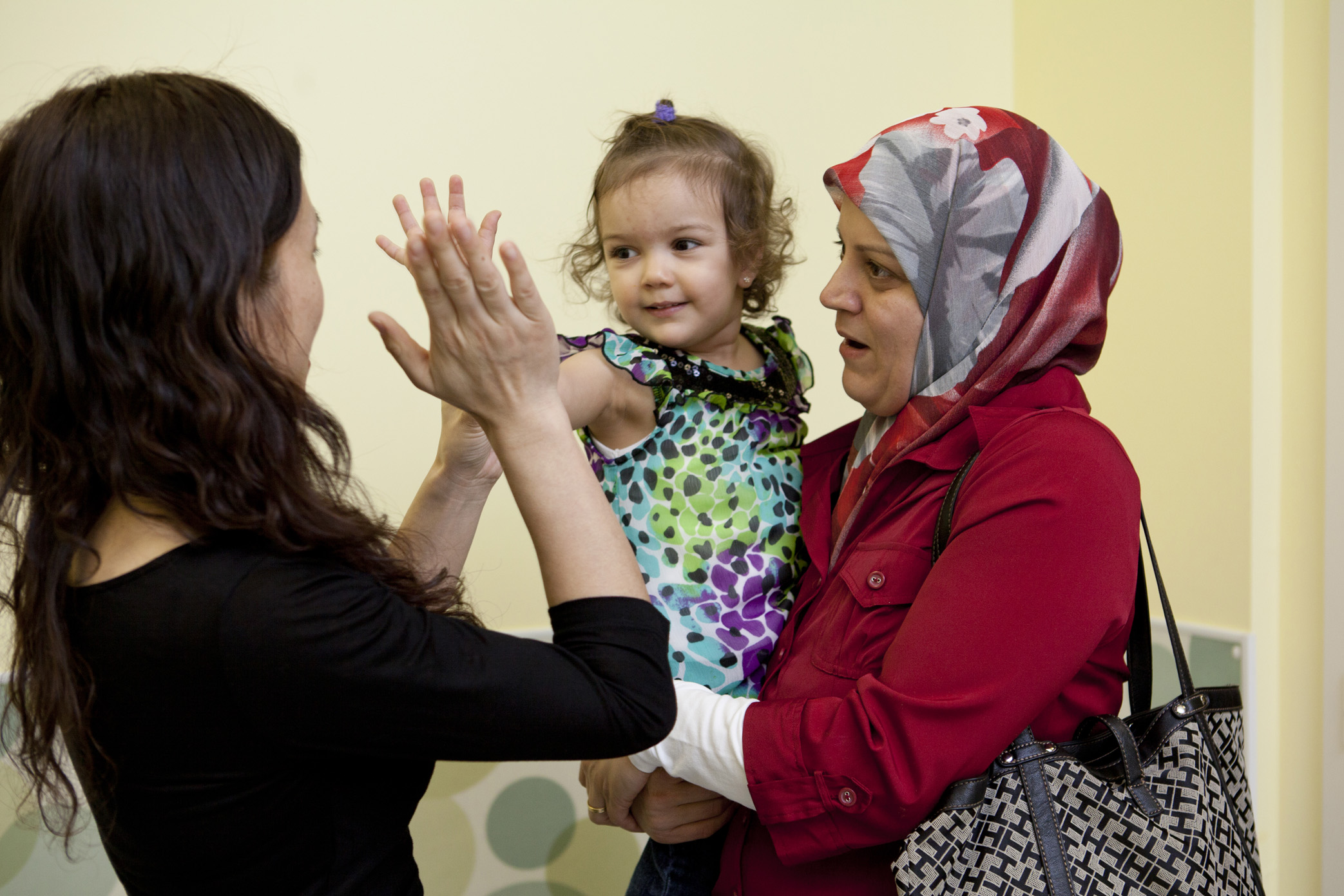CNC programs support the development of the individual child and the settlement of the family.
Even though CNC is only in its second year of operation, CMAS wanted to hear from newcomer parents and get a deeper understanding of the challenges they face. How were they coping after migrating to a new country with young children? Were the CNC services helping?
To hear directly from the newcomer parents, CMAS conducted a series of focus groups in Hamilton, Mississauga, Halifax and Toronto. They also interviewed a number of parents and staff individually. Participants included newcomer parents who were currently using Short and Long Term CNC programs.The research uncovered a wealth of information! Feedback from newcomer parents confirmed that CNC programs successfully supports children’s development – newcomer children are learning good behaviour and are prepared for school. But parents revealed challenges of their own.
An overarching theme of being alone
The primary challenge parents reported was being “alone” as they tried to navigate the many complex layers of their new life.
“You are by yourself.”
“I don’t have family here, just my husband and baby; I need help and someone to help and my husband has to work so being alone is very hard.”
“Before they had family to help; now they have no one to lean on, including the father because he’s working.” (CNC staff)
“These moms say to us ‘I’m exhausted. I’m alone. Nobody to help me.’ They are used to having help from the extended family.” (CNC staff)
The challenge of language
The language barrier is another primary challenge that also contributes to parents feeling alone.
A parent who cannot speak English may have difficulty communicating at the doctor’s office, hospital, grocery store, taking a bus, or talking to their child’s teach
er. They often have trouble asking basic questions such as where to buy groceries or medicine.
“It’s the language, my English; communication is more important than everything else to understand for my children.”
“Getting information is hard because no English.”
“It’s difficult with the language and how to have a conversation with other people; when kids are sick and you have to go to the doctor it is a problem with the language.”
The stress of medical situations when there is a language barrier was very obvious – both for routine appointments and in emergency situations. In fact, in every focus group, more than one participant shared stories about stressful medical situations.Parents
may not be able to ask a neighbor for help watching the children while the parent goes to hospital; parents are unable to talk effectively with medical staff; they may have difficulty understanding how the medical system works; and because communication is difficult, parents may not receive the emotional support they need.
“It’s a big problem; if you have an appointment with the doctor I always need someone with me; couldn’t understand anything. Who will come with me when my husband works?”
“My daughter fell and hurt her arm and my husband was not available. I felt alone and I can’t help my daughter. I tried to call 911 but I couldn’t explain. They came with an interpreter; at that time I felt alone. Back home I could take care of this alone.”
“I needed my husband with me while I was in the hospital but I had children at home and I couldn’t find anyone to care for my child. I had no friends here; a woman volunteered to help her but I didn’t know who she was and I had to pay her.
“I have two kids with one year age different; one went to the hospital and the other stayed with me. There is no place to put the other kids. I had to stay in the hospital for two weeks with both kids. This is very new in Canada to me; I have no friends to help.”
“When my baby was born he lost weight. Doctor said this is normal and said to keep breast-feeding him and no formula, but I had no milk. I couldn’t speak with anyone to explain; my husband had to speak for me. I felt very frustrated. I really needed help.”
CNC staff revealed an important emerging trend they are seeing with the parents in their programs. There appears to be a rise in the number of ‘single’ parents created by the husband’s need to work and sometimes to work out of the country all together.Newcomer parents as ‘single parents’
“They come as a family but mom stays here but father works somewhere else; they are here alone; they miss the family and this influences the wife and children.”
“They come together, the father stays maybe for six months but goes back and stays there to work and only comes here to visit. He has no intention to move to Canada. He lives there and his family lives here. This is a patriarch family; the dad worked and mom stayed home. Now suddenly the mother needs to take both roles. It’s a single mother family and she has problems with the children, especially the boys because the son doesn’t see the mother as a powerful figure in the family.”
Newcomer parents have difficulty accessing existing services
Often newcomer parents who don’t speak English or French simply don’t know about or aren’t able to access existing services. As a result, many parents feel lost. The sooner they are able to find a place where they can learn the language, the sooner they learn about other resources that are available to help them in their settlement.
“You need some place to go when you come with information and to tell you information about everything for your child; we know nothing.”
“I don’t know where the stores are; if my daughter is sick I don’t know where to get medicine and do I pay for the medicine; and where to shop for diapers; which food is better from my daughter here; what kind of milk or fruit; and where is daycare for my daughter.”
“Nobody told me about [ESL] school so I stayed home for one year.”
“I had no English at all in the first year and nobody with my language was near me; now I know there are lots of free services but nobody told me.”
All parents, whether they are new parents or have older children, need support from friends and family. However, newcomer parents can be very isolated. They describe the need to have ‘someone’ to talk with.
 Newcomer parents need personal support
Newcomer parents need personal support
In fact, newcomer parents were clear – they don’t need more written information; they need personal, face-to-face assistance and support.
“Someone.”
“Someone to guide you.”
“Someone to explain.”
“Advice and someone to talk to.”
“Someone to tell you.”
Newcomer parents want someone to listen and talk with them. They want to be engaged in the conversation about themselves and their children.
“Talk with me even with the information you give me.”
“Information should be face-to-face; in a session like this.”
“Friendships; you’re alone and nobody to call or talk to.”
“You can share children and talk to each other.”
“Mothers need to share information and give advice.”
The focus groups point to solutions
Although the focus groups were intended to provide an opportunity to hear feedback from the newcomer parents, it was obvious that the groups themselves were ‘therapeutic’, providing an outlet for the parents to share their thoughts and feelings – an opportunity to be heard. They were happy to provide a wealth of heartfelt feedback simply because someone cared enough to ask and to listen.
The focus groups also provided an opportunity for parents to ask questions and engage in conversations with other parents. It is therefore not surprising that the parents’ suggestions offered practical ideas to help close the gap on their isolation.
Newcomer parents suggested parenting classes, monthly group meetings, an information center and the use of interpreters. Each of these solutions could help bridge the gap between feeling alone and being engaged – feeling a connection to other parents.
The feedback from parents helps CNC staff find ways they can help families even more! Practical suggestions include:
- Keeping parents informed about resources and settlement services that are available to them.
- Sharing information on local resources like how to access libraries, community centers and early years centers where parents can get out and meet others.
- Taking time to listen and talk to families.
- Sharing useful articles and other information about the local community.
- Finding new ways to introduce parents to each other and planning opportunities for them to share with one another.
- Providing guest speakers to talk with parents about issues that are important to them.
These suggestions can help to reduce the loneliness that newcomer parents feel and support successful settlement with the help of the many excellent services available to newcomer parents.
CNC staff plays a valuable role
The new CNC program is still in its infancy, but the program has already had a positive impact on the families served. Even with all of the feelings of loneliness, isolation and lack of family, newcomer parents were quick to share their positive feelings towards their CNC ‘family:’
“They treat us like family. And they know every child by name.”
“Teachers are just like mom.”
“It’s a social environment. Feel like a family with the parents and teachers.”
CNC staff definitely help and support the parents and children that they serve.







